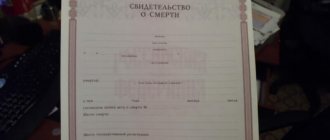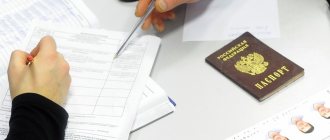From the news feed
According to the new rules on inheritance, there is no need to wait for information about opening a case from a notary located at the place of residence of the testator. The potential heir simply goes to the website of the chamber of notaries in the section of the register on inheritance matters, indicates the last name, first name and patronymic of the testator, the date of his birth and death. Here it will be indicated whether there is an inheritance case, if so, then the notary will be indicated.
Starting from 2021, Rosreestr will provide the notary with information about the existing joint property of the testator and his spouse. Also, all banks are required to provide information about citizens’ deposits in “Fins” of Russia. Therefore, the notary will be able to obtain all the information about the deposits and pension savings of the testator. Relatives of the deceased will be able to receive all the money and property they are entitled to.
Change of notary
Cases related to registration of inheritance last a long time. The notary needs to collect all the information about the estate, notify the heirs, etc. There are objective reasons that delay the period of registration of the inheritance. But it happens that the process is delayed due to the fault of the notary. Then the heirs have a desire to change the notary. But there must be good reasons for this.
Rights and obligations of a notary
The powers of a notary representative are secured by the provisions of the law. The notary has the right:
- Perform legally significant actions in the interests of citizens/organizations.
- Develop draft agreements and other documents and make copies of them.
- Provide citizens with explanations regarding the actions being taken.
- Request the necessary documents from citizens and representatives of organizations.
- Submit an application for state registration of ownership of real estate.
- Receive the necessary information about business entities from the Unified State Register of Legal Entities or Unified State Register of Individual Entrepreneurs.
When performing legally significant actions, the notary is obliged to:
- To assist citizens and enterprises in every possible way in the implementation of their legitimate interests.
- Explain to parties to transactions their rights/responsibilities, as well as possible legal consequences.
- Keep confidential any information that has become known as a result of professional activities.
- Notify fiscal authorities about the issuance of inheritance certificates and the conclusion of gift agreements.
- Refuse citizens to carry out notarial actions if they contradict the requirements of the law or international agreements.
- Improve your qualifications every 4 years
After the inheritance case is opened
The basis for opening an inheritance case is a death certificate. Usually the heirs themselves deal with this issue. It happens that an inheritance case is opened automatically upon the death of a person. This may be in a small area where there is only one notary.
Reasons prompting heirs to change a notary may be the following:
- the testator lived in another region and this creates problems associated with regular trips;
- unlawful conduct of inheritance business by a notary;
- deprivation of a notary of his status.
Changing the notary who is handling the inheritance case is possible if the “Inheritance Without Borders” program has been created and is operating in the region. In other cases, the inheritance is opened at the place of death of the testator and the territory in which his property is located.
Legal basis
In his activities, a notary is guided by the following regulatory and local acts:
- Fundamentals of the legislation of the Russian Federation on notaries.
- Civil Code.
- Family code.
- Guidelines.
Other regulatory documents are applied as necessary. Much depends on the type of inherited property. For example, if the object of inheritance is a share in the authorized capital of a limited liability company, then when preparing documents, the provisions of the Federal Law “On LLC” dated 02/08/1998 No. 14-FZ are taken into account.
By decision of the judiciary
It is possible to legally change a notary only by court decision. To file a claim, you need to know your rights well.
The main reasons on which heirs can go to court are as follows:
- unlawful actions on the part of the notary;
- heirs do not have the opportunity to be at the notary office where the inheritance case is being formalized.
You can appeal the actions of a notary by writing a statement:
- To the Department of Justice located in the region.
- To the Notary Chamber.
- To the judiciary.
The text of the complaint must indicate the actions and reasons associated with the unacceptable behavior of the notary.
Typically, complaints are filed due to inflated rates and unreasonable payments during inheritance proceedings. It is enough to file a complaint to higher authorities and the notary will return the money. In case of more serious violations, you need to file a claim in court.
Which notary should handle inheritance business?
A candidate for receiving material benefits (or part thereof) has the right to resort to private services or specialists from the state notary chamber. Having chosen one of these options, the potential heir must submit a qualifying application. The opening of an inheritance case must be carried out at the place of permanent residence of the deceased.
If there are no difficulties in determining the place, any notary working in the chamber of a given district can deal with this matter. Compulsory membership of all notaries working privately in the district is considered a strict requirement.
In a situation where difficulties arise in identifying a notary, the following options are possible:
- The location of the movable and immovable property of the deceased may become the place where an inheritance case is opened. This is stated in the Civil Code (Article 1115, paragraph 2). If there are several places, priority will be given to where the part of the inheritance with the greatest value is located. The same applies to movable property.
- In the notarial environment, the principle of distributing inheritance cases according to the first letter of the surname applies. Documents are submitted to the notary to whom certain names of deceased citizens are assigned.
- If it is not possible to determine the place in accordance with the provisions of Article 1115 of the Civil Code of the Russian Federation, the issue is resolved in court. A fact of legal significance will be subject to consideration (in accordance with Article 264 of the Code of Civil Procedure of the Russian Federation). The appointment to the role of leading the inheritance case will take place in full accordance with the decision of the judicial authority.
- When the testator’s property is located on the territory of the Russian Federation, and he himself lived abroad, the issue is resolved taking into account the international treaties existing between countries. If there are none, you need to be guided by the norms of Article 1224 of the Civil Code of the Russian Federation.
There are also general professional requirements for notaries, including those dealing with inheritance matters. First of all, they are lawyers with high moral qualities. Their activities are regulated by legislative acts. For example, in Moscow there is a “Professional Code” approved by the members of the MGNP more than 15 years ago.
FAQ
A will was registered in my name by a notary. Is it possible to open an inheritance case with another notary?
- First you need to contact the notary who certified the will. He must make a note that the will has not been changed and there is no cancellation. Only then can you turn to another notary to conduct the case.
What are the deadlines for opening an inheritance case at a notary office?
- The notary must be contacted within six months, starting from the opening of the inheritance. This date is counted from the date of death of the testator.
My mother died. The notary opened a case regarding inheritance. When can I contact him and receive a certificate of inheritance?
- After completing six months from the date of your mother's death. This can be done any day before the expiration of the specified period upon provision of all documents. If not all documents have been collected, then they can be collected without a time limit, since the inheritance has been accepted.
Behind the scenes of the notary office. Inheritance
Lately, one can increasingly hear the myth that “a notary only puts a stamp and takes money for it.” This myth was not formed by chance, but precisely due to the fact that for the public the “visible” aspect of a notary’s activity remains only the “reception of citizens” as such, which is expressed in the fact that “the notary spoke, printed the document and put his seal and signature.” However, in addition to the “visible” aspect of a notary’s activity, there is also the so-called “behind the scenes”, which remains behind the scenes of the attention of citizens and other persons and which is not so obvious, but takes up a lot of time in the work of any notary.
“Behind the Scenes” - Part 2
What does a notary do when a person turns to him to formalize an inheritance case and to issue a “Certificate of Right to Inheritance”? What activities and services are provided to them?
1. The first thing any notarial action begins with is establishing the identity of the person applying. This function is implemented by notaries as follows:
A. Comparison of the identity of the person who contacted the notary with the photograph in the provided passport.
b. Checking the personal data of the person applying to the notary indicated in the presented passport in order to clarify and confirm them.
V. Checking the passport for its validity is carried out by a notary through a visual inspection of the integrity of the passport, as well as by sending a request to the FMS based on the passport data. (“expiration”, “loss”, “damage or destruction”).
Then, after the identity of the applicant has been established, the notary proceeds to establish the will of the person (i.e., his desire to draw up a specific document).
2. Establishing the will of the person. This function is implemented by notaries as follows:
A. During the conversation, the notary finds out what document the individual has applied for.
b. Does the individual voluntarily wish to draw up the document indicated by him, is he not mistaken in his desire, does the will of the person correspond to his actual intentions or the need for the situation that has developed for him.
V. During the conversation, the notary gives a legal assessment of the compliance of the will of the person applying for notarial action with the requirements of the law and the absence of illegal goals.
After establishing the identity and will of the person who applied to the notary, the next stage follows - an explanation of the legal consequences of the required notarial action.
3. Explanation of the legal consequences of the document being drawn up (notarial act). This function is implemented by notaries as follows:
A. The notary explains the legal meaning of this document (notarial act) and all its legal consequences that may occur in the future, after the document is executed (both in the case of acceptance of the inheritance and in the case of refusal to accept it).
b. A notary gives advice on the performance of a specific notarial act, the execution of a specific document for which an individual has applied.
V. Explains the requirements imposed by law regarding the procedure for drawing up a specific document and requests from the applicant all the necessary information (data) to include it in the text of the document.
After this, the notary checks for the presence/absence of factors influencing the possibility of performing this notarial action in relation to the applicant
4. Checking for the presence/absence of factors influencing the possibility of performing a notarial act. This function is implemented by notaries as follows:
A. The notary carries out an electronic request to check the legal capacity of the applicant (for the presence/absence of a procedure for declaring a citizen incompetent/not fully capable).
b. The notary makes an electronic request to check whether there is no bankruptcy procedure initiated against the applicant.
V. The notary checks for the presence/absence of threat/deception, misrepresentation/pressure and other circumstances affecting the free formation of the will of the person applying.
The notary checks for involvement in terrorist and extremist activities.
d. If a ready-made draft document is provided, the notary carries out a legal examination of the submitted draft document and establishes its compliance with the requirements of the current legislation and the actual intentions of the applicant.
E. When preparing individual notarial documents, the notary checks the fact of family relationships by sending an electronic request to the civil registry office, government agencies, institutions, credit and other organizations.
The next step in accepting an application for acceptance/refusal of accepting an inheritance is to request all the necessary information and documents necessary for the formation of an inheritance case.
5. Request for information and documents necessary for the formation of an inheritance case. This function is implemented by notaries as follows:
A. The notary requests from the heirs documents containing information necessary for the formation of the inheritance case, namely:
* Passport, SNILS - heir
* Death certificate - testator
* Certificate of place of registration (registration) of the testator
* Document confirming family relations (birth certificate/marriage certificate/certificate of paternity, etc.)
* Will (if available)
* Documents for property belonging to the deceased:
— For banks — savings books, cards, contracts, shares,
— For weapons — permission from the Russian Academy of Arts
— For motor transport - vehicle passport, vehicle registration certificate, self-propelled vehicle passport, assessment act/report
— For real estate — title document (agreement/certificate/decree/state act/certificate of the right to inheritance) + title document (Certificate of state registration of rights BTI/Certificate of state registration of rights Rosreestr/Extract from the Unified State Register of Real Estate)
b. Conducts legal examination of provided documents and studies them.
V. If any inconsistencies/shortcomings/inaccuracies are identified in the submitted documents, he conducts a consultation and explains the possible procedure for eliminating them.
d. Makes copies of the submitted documents to place them in the registered inheritance file.
The next step when performing a specific notarial act (certifying transactions) is drawing up the text of the document and its production on paper and/or electronic media.
6. Typing the required text of the requested document and then printing it.
7. After printing the document, the notary reads the prepared document aloud to the applicant and provides the opportunity to personally familiarize himself with the contents of the prepared document for its subsequent signing by the applicant.
8. The next stage is certification of the prepared document by a notary by affixing the notary’s signature on it and certifying it with an official seal.
9. After this, the notary registers the completed notarial act in the register of registration of notarial acts, in which the applicant signs for receipt of the executed document and payment of the fee.
10. The next stage is the actions of the notary aimed at entering into the unified notary databases in the Russian Federation.
The next step when performing a specific notarial act is the formation of an inheritance file and entering data on it into the registers.
11. Formation of an inheritance case and entering data on it into registers. This function is implemented as follows:
A. Data on persons who accepted an inheritance or refused an inheritance are entered into the Register Book of Inheritance Affairs.
b. Data about the opened inheritance case and about the deceased are entered in the Alphabetical Book of Inheritance Cases.
V. Formation of an inheritance case in a unified database of inheritance cases and its registration.
The next step when performing a specific notarial act is to carry out the necessary verification requests within the framework of the inheritance case.
12. Carrying out necessary verification requests. This function is implemented as follows:
a. The notary carries out the necessary requests to Rosreestr aimed at verifying the ownership of real estate by the deceased and establishing compliance of the submitted documents with Rosreestr data.
b. The notary makes a request to Sberbank aimed at checking the presence/absence of any accounts/deposits of the deceased and the presence of funds on them that are subject to inheritance.
V. The notary makes the necessary requests to other institutions (Pension Fund, Social Security, other banks (except Sb), Registrar services (regarding shares/bonds) by mail.
d. If necessary, the notary searches for/notifies other heirs by posting a corresponding announcement on the FNP website.
The next step when performing a specific notarial act is to study all the responses received on previously completed requests.
13. Study of all responses received from various organizations.
14. Preparation based on the information available in the materials of the inheritance file - “Certificates of the right to inheritance”
15. Notification of all heirs who accepted the inheritance about the time, date and place of issuance of the “Certificate of the right to inheritance” and about the required price to be paid for the work done on the inheritance matter.
16. Issuance of “Certificates of the right to inheritance” to the heirs with the simultaneous creation of an electronic scanned image of the document and sending it to Rosreestr for registration of the right.
17. Receiving a response from Rosreestr about registration/suspension/refusal of registration and resolving this issue.
18. Certification and issuance of an “Extract from the Unified State Register of Real Estate” to all heirs who accepted the inheritance.
19. After this, the notary registers the completed notarial act in the register of registration of notarial acts, in which the applicant signs for receipt of the executed document and payment of the fee.
20. The next stage is the actions of the notary aimed at entering into the unified notary databases in the Russian Federation.
Based on the above, we can draw the following conclusion:
The activities of a notary are not at all limited to “affixing a signature and seal” on a document, but include a whole range of services provided within the framework of a specific notarial act.
How to submit an application to a notary online
The applicant sends to the notary through the Unified Information System an application to perform a notarial act, attaching the documents established by law - in electronic form or scanned images. Then the notary prepares the notarial document in electronic form and sends it to the applicant. Or, at the request of the applicant, it can issue it on paper.
You can submit your application to a notary online on the State Services website. In this case, the identity of the applicant will be established by checking:
- its registration in the Unified Identification and Authentication System for the provision of state and municipal services in electronic form;
- enhanced qualified electronic signature of the applicant.
Also, an application for a notarial act can be sent to the Federal Tax Service through:
- personal account of the UIS notary;
- EIS web service.
To submit an application, fill out the application form in one of the specified services.
You need to choose the place where the action will take place – a notarial district or a subject of the Russian Federation. And the application will go to the first notary in line . You will receive a notification about its acceptance. But they may be asked to change the place if there were no notaries in the queue.
What documents regulate online notary
The work of notaries in Russia is still regulated by the Fundamentals of the legislation of the Russian Federation on notaries (approved by the Supreme Court of the Russian Federation on February 11, 1993 No. 4462-1) (hereinafter referred to as the Fundamentals). But since December 29, 2021, Federal Law No. 480-FZ dated December 27, 2019 has made numerous changes and additions to the Fundamentals. They are aimed at:
- optimization of notarial activities;
- increasing the demand for notarial protection of the rights of citizens and legal entities in the context of the development of the digital society.
In particular, a new article has been added to the Fundamentals. 44.3 “Performing notarial acts remotely.” Amendments have also been made to Art. 81, 86, 87, 88.1, 89, 103 and 103.7 of the Fundamentals governing the general procedure for performing relevant notarial actions.
In development of the provisions on online notaries, Order No. 232 of the Ministry of Justice of Russia dated September 30, 2020 approved:
- the procedure for submitting an application to perform a notarial act remotely;
- the procedure for paying for notarial acts, including using electronic means of payment;
- the procedure for returning the payment to the applicant for performing a notarial act remotely;
- the procedure for interaction between the applicant or his representative who has applied to perform a notarial act remotely and the notary.
These regulations were also approved by decision of the board of the Federal Notary Chamber (FNC) dated September 16, 2020 No. 16/20.










